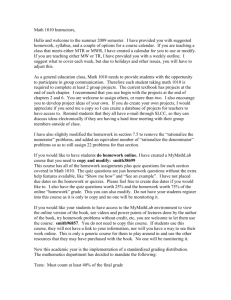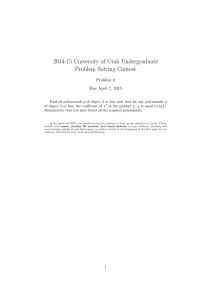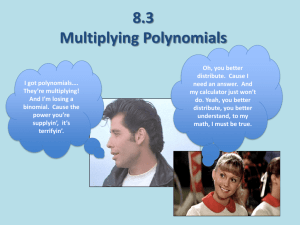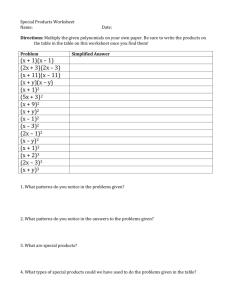Roadmap Assignment Chapter 4 word problems Homework questions for §4.2, 5.1
advertisement
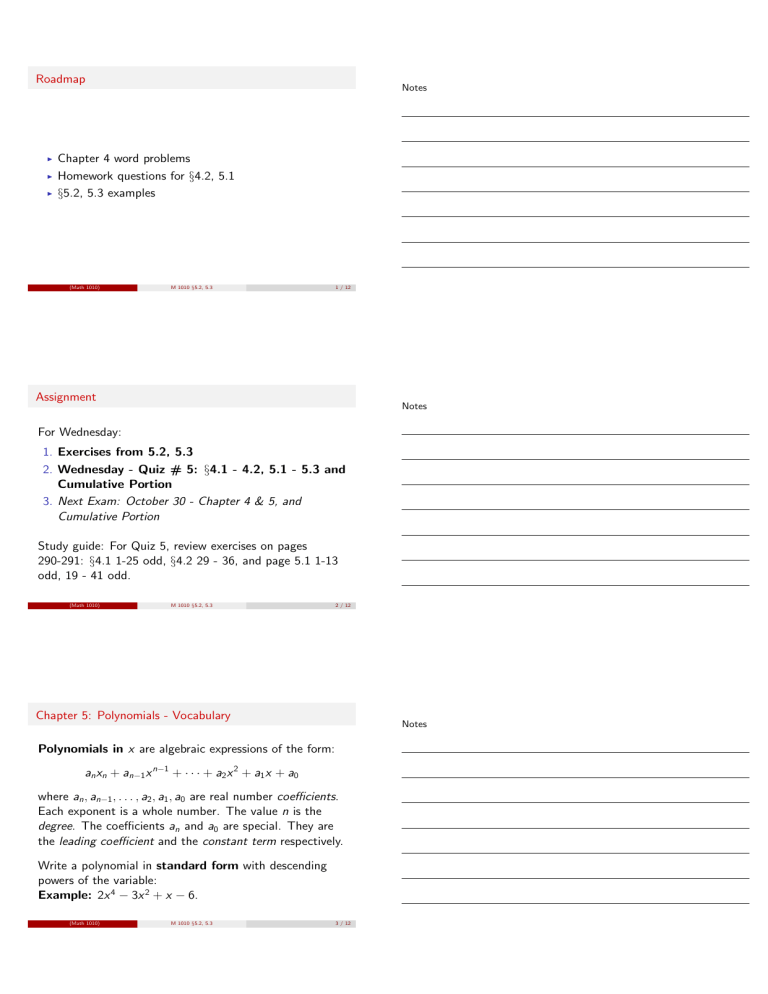
Roadmap I I I Notes Chapter 4 word problems Homework questions for §4.2, 5.1 §5.2, 5.3 examples (Math 1010) M 1010 §5.2, 5.3 1 / 12 Assignment Notes For Wednesday: 1. Exercises from 5.2, 5.3 2. Wednesday - Quiz # 5: §4.1 - 4.2, 5.1 - 5.3 and Cumulative Portion 3. Next Exam: October 30 - Chapter 4 & 5, and Cumulative Portion Study guide: For Quiz 5, review exercises on pages 290-291: §4.1 1-25 odd, §4.2 29 - 36, and page 5.1 1-13 odd, 19 - 41 odd. (Math 1010) M 1010 §5.2, 5.3 2 / 12 Chapter 5: Polynomials - Vocabulary Notes Polynomials in x are algebraic expressions of the form: an xn + an−1 x n−1 + · · · + a2 x 2 + a1 x + a0 where an , an−1 , . . . , a2 , a1 , a0 are real number coefficients. Each exponent is a whole number. The value n is the degree. The coefficients an and a0 are special. They are the leading coefficient and the constant term respectively. Write a polynomial in standard form with descending powers of the variable: Example: 2x 4 − 3x 2 + x − 6. (Math 1010) M 1010 §5.2, 5.3 3 / 12 §5.2 - Adding and Subtracting Polynomials Notes To add or subtract polynomials, combine like terms. Example: Add 5x 3 + 2x 2 - x - 7 4x 2 - 4x + 6 = (5 + 0)x 3 + (2 + 4)x 2 + (−1 − 4)x + (−7 + 6) = 5x 3 + 6x 2 − 5x − 1 (Math 1010) M 1010 §5.2, 5.3 4 / 12 §5.2 - Adding and Subtracting Polynomials Notes Example: Subtract (x 3 − 6x + 5) − (2x 3 − 3x 2 + 7x − 1) (x 3 −6x + 5) − (2x 3 − 3x 2 + 7x − 1) = (x 3 − 6x + 5) + (−2x 3 + 3x 2 − 7x + 1) = (x 3 − 2x 3 ) + (3x 2 ) + (−6x − 7x) + (5 + 1) = −x 3 + 3x 2 − 13x + 6 (Math 1010) M 1010 §5.2, 5.3 5 / 12 §5.2 - Adding and Subtracting Polynomials Notes Examples: # 29: Find the sum. (2x 2 − 3) + (5x 2 + 6) # 43: Find the sum. (5x 2 − 3x + 4) + (−3x 2 − 4) # 53: Find the difference. (3x 2 − 2x + 1) − (2x 2 + x − 1) # 63: Find the difference. (x 2 − x + 3) − (x − 2) # 71: Perform the operations: (4x 5 − 10x 3 + 6x) − (8x 5 − 3x 3 + 11) + (4x 5 + 5x 3 − x 2 ) (Math 1010) M 1010 §5.2, 5.3 6 / 12 §5.3 - Multiplying Polynomials Notes Monomials have only one term. Example: Multiply the polynomial with the monomial (applying the Distributive property): 5x 2 (3x − 8) 5x 2 (3x − 8) = 5x 2 (3x) + 5x 2 (−8) = 15x 3 − 40x 2 Example: (−7x 3 + 15x 2 − 1)(−x 4 ) (−7x 3 + 15x 2 − 1)(−x 4 ) = (−7x 3 )(−x 4 )+(15x 2 )(−x 4 )+(−1)(−x 4 ) = 7x 7 −15x 6 +x 4 (Math 1010) M 1010 §5.2, 5.3 7 / 12 §5.3 - Multiplying Polynomials Notes Multiplying two binomials uses the Distributive Property (mnemonic is ”FOIL” - First, Outside, Inside, Last). Example: (2x + 3)(5x − 1) (2x + 3)(5x − 1) = 2x(5x − 1) + 3(5x − 1) = (2x)(5x) + (2x)(−1) + (3)(5x) + (3)(−1) = 10x 2 − 2x + 15x − 3 = 10x 2 + 13x − 3 (Math 1010) M 1010 §5.2, 5.3 8 / 12 §5.3 - Multiplying Polynomials Notes The Distributive Property applies when multiplying polynomials with more terms than two. Example: (x + 2)(−x 2 − 4x + 7) (x + 2)(−x 2 − 4x + 7) = (x)(−x 2 − 4x + 7) + (2)(−x 2 − 4x + 7) = (−x 3 − 4x 2 + 7x) + (−2x 2 − 8x + 14) = −x 3 − 6x 2 − x + 14 (Math 1010) M 1010 §5.2, 5.3 9 / 12 §5.3 - Multiplying Polynomials Notes Special Products The Sum and Difference of The Same Two Terms (u + v )(u − v ) = u 2 − v 2 Square of a Binomial (u + v )2 = u 2 + 2uv + v 2 (u − v )2 = u 2 − 2uv + v 2 When squaring a binomials the middle term result will always be plus/minus twice the product of the two terms. (Math 1010) M 1010 §5.2, 5.3 10 / 12 §5.3 - Multiplying Polynomials Notes Example: (6x − 7)(6x + 7) is 36x 2 − 49. Here’s why: 36x 2 − 49 = (6x − 7)(6x + 7) = (6x)(6x + 7) + (−7)(6x + 7) = 36x 2 + 42x − 42x − 49 Example: (5 − 2x)2 (5 − 2x)2 = (5 − 2x)(5 − 2x) = 25 − 10x − 10x + 4x 2 = 4x 2 − 20x + 25 (Math 1010) M 1010 §5.2, 5.3 11 / 12 §5.3 - Multiplying Polynomials Notes Examples: # 23: (5x − 2)(2x − 6) # 33: (x − 1)(x 2 − 4x + 6) # 45: (7x 2 − 14x + 9)(2x + 1) # 69: (x + 5)2 # 83: (k + 5)3 # 89: (6x m − 5)(2x 2m − 3) (Math 1010) M 1010 §5.2, 5.3 12 / 12
